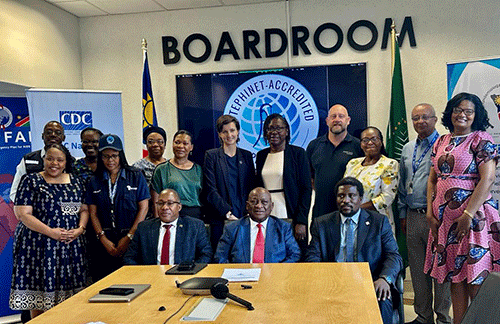HEALTH minister Dr Kalumbi Shangula says the accreditation of Namibia’s Field Epidemiology and Laboratory Training Programme is an important milestone in the endeavours to strengthen the health care system to make it more robust, resilient, and responsive.
Shangula said it is the duty of government and stakeholders to enhance efforts to promote the health security agenda.
“We acknowledge the efforts of the graduates from this programme in the surveillance, detection, prevention, and response to the Covid-19 pandemic. I call upon all stakeholders, both in the public and private sectors, as well as non-governmental organisations to join hands in building the strong public health system,” said Shangula.
In 2012, the Field Epidemiology and Laboratory Training Programme was initiated with financial and technical support from US Centres for Disease Prevention and Control (CDC), with the training programme starting with the short course tier, now referred to as the frontline tier, which is designed to build capacity for frontline health care professionals.
The minister emphasised that public health security requires the whole-of-government and the whole-of-society approach, as we deal with pandemics that affect both human and animal health.
The ministry was supported by the WHO, Africa-CDC, and Robert Koch Institute (RKI) in pursuit of developing the public health workforce in in the country.
“As a member of the African Epidemiology Network (AFENET) programme, Namibia has immensely benefited from their technical guidance throughout this journey. Local institutions and stakeholders, such as the Ministry of Agriculture, Water and Land Reform, have also made great contributions to this achievement,” said Shangula.
The programme has since witnessed the successful training and graduation of many candidates who have been deployed as field epidemiologists in Namibia and elsewhere.
He said the training and other related programmes are connected globally through an organization called, the Training Programmes in Epidemiology and Public Health Interventions Network.
Shangula further said the network supports the development of epidemiology capacities across the globe, to protect, promote health and strengthen public health system to ensure health security.
“We know that no country is safe until all countries are safe from public health threats,” he said.
University of Namibia (Unam) vice-chancellor Kenneth Matengu gave an assurance that the institution will continue to ensure all its programmes are reviewed to achieve quality education by striving to improve all academic programmes or even exceed international standards.
“Teaching and learning, research, and innovation, as well as community engagement and outreach are key aspects of university education. Accreditation indicates that an institution provides quality education,” said Matengu.
He said, as an institution of higher education, Unam believes in collaboration that positively contributes to government’s programmes of action, in addressing issues such as critical skills development.
Rachel Coomer from CDC Namibia said since 1980, more than 80 countries have participated in CDC-supported FETP-Advanced programmes and produced over 5 000 disease monitors and that gaining the TEPHINET accreditation highlights Namibia’s place in global disease detection.
“Nam-FELTP is noteworthy in that 75% of the course requires field work, it is not a course that is 100% theory. I want to highlight and commend the residents for signing up for a programme that requires dedication and commitment to get into the field and put skills into action,” said Coomer.


